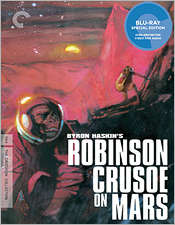Robinson Crusoe on Mars (Blu-ray Review)

Director
Byron HaskinRelease Date(s)
1964 (January 11, 2011)Studio(s)
Paramount (Criterion - Spine #404)- Film/Program Grade: A
- Video Grade: A-
- Audio Grade: B+
- Extras Grade: B+
Review
When his space shuttle has suddenly crash landed, Astronaut Commander Kit Draper (Paul Mantee) must find a way to survive on the unexplored planet of Mars. As he fights for his survival, he soon discovers that he isn’t the only one hanging around on the big red planet.
Robinson Crusoe on Mars is one of the lost gems in American science fiction cinema. Prior to the birth of “realistic” and “well-informed” sci-fi films like 2001: A Space Odyssey, there were very few projects that paid any real attention to what was going on scientifically and technologically in the 1960’s – and those that did didn’t really make much of an impact on audiences or critics. At the time, this film resembled more truthfully what was going on at NASA than even the filmmakers were aware of. Aesthetically, the piece really shines, and is a far better designed and executed story than even some of Byron Haskins’ previous projects. This particular film is more about a human’s lone survival, physically and mentally, than about strange space creatures or technology. While the former isn’t even utilized in the film (as it was in the original book), the latter is miniscule and just a means of telling a story without much attention being paid to it. It’s also interesting to note that it has the look and feel of the Star Trek TV series, which was just right around the corner (and I mean that in the best possible way).
For the Criterion Blu-ray release, be rest assured that the A/V presentation is a good one. It looks the best it possibly can with only slightly more grain than normal and an even color palette. Mostly blacks, tans and reds are seen for the duration of the film, but they are all pleasantly stable and easy on the eye. For budgetary reasons, the film was shot using the Techniscope process and enlarged for a 2.35:1 theatrical presentation. The reasons for this were mostly budgetary, and while the image isn’t quite as crisp as it could have been had they just shot anamorphically, it is by no means unpleasant. The transfer on this disc was struck from the original negative and not the aforementioned blown-up theatrical print, so it does everything that it should and more without any major distractions. The original uncompressed monaural soundtrack is also included, but it doesn’t pop quite as much as I was hoping it would. It has some aural depth and opens the film up in places, but some of the dialogue and sound effects sound a bit on the choppy side to me. A minor complaint, but again, not a major issue.
Supplementing the film aren’t an enormous amount of extras, but there are some good ones to pick through. First up is an audio commentary with screenwriter Ib Melchior, actors Paul Mantee and Victor Lundin, production designer Al Nozaki, special effects designer and Robinson Crusoe on Mars historian Robert Skotak, and snippets of an audio interview with director Byron Haskin. Next is Destination Mars, a featurette that covers how the film presents its technology and how accurate it is (or inaccurate in some cases). Also included is a music video made by the folks at Criterion using footage from the film set to Victor Lundin’s recording of “Robinson Crusoe on Mars”, a still gallery featuring many early concepts for designs in the film, the original theatrical trailer, and finally a 13 page booklet featuring an essay by Michael Lennick, Ib Melchior’s Brief Yargorian Vocabulary and a list of facts about Mars itself.
Had Robinson Crusoe on Mars been a little more successful, it makes you wonder what the science fiction film landscape would have evolved into. Rarely seen and rarely mentioned at all, it deserves the cult audience it has garnered. Given that this great Criterion release sheds some light on a mostly forgotten treasure of a movie, it calls for a revival – and it’s definitely worth adding to your collection. Highly recommended.
- Tim Salmons

